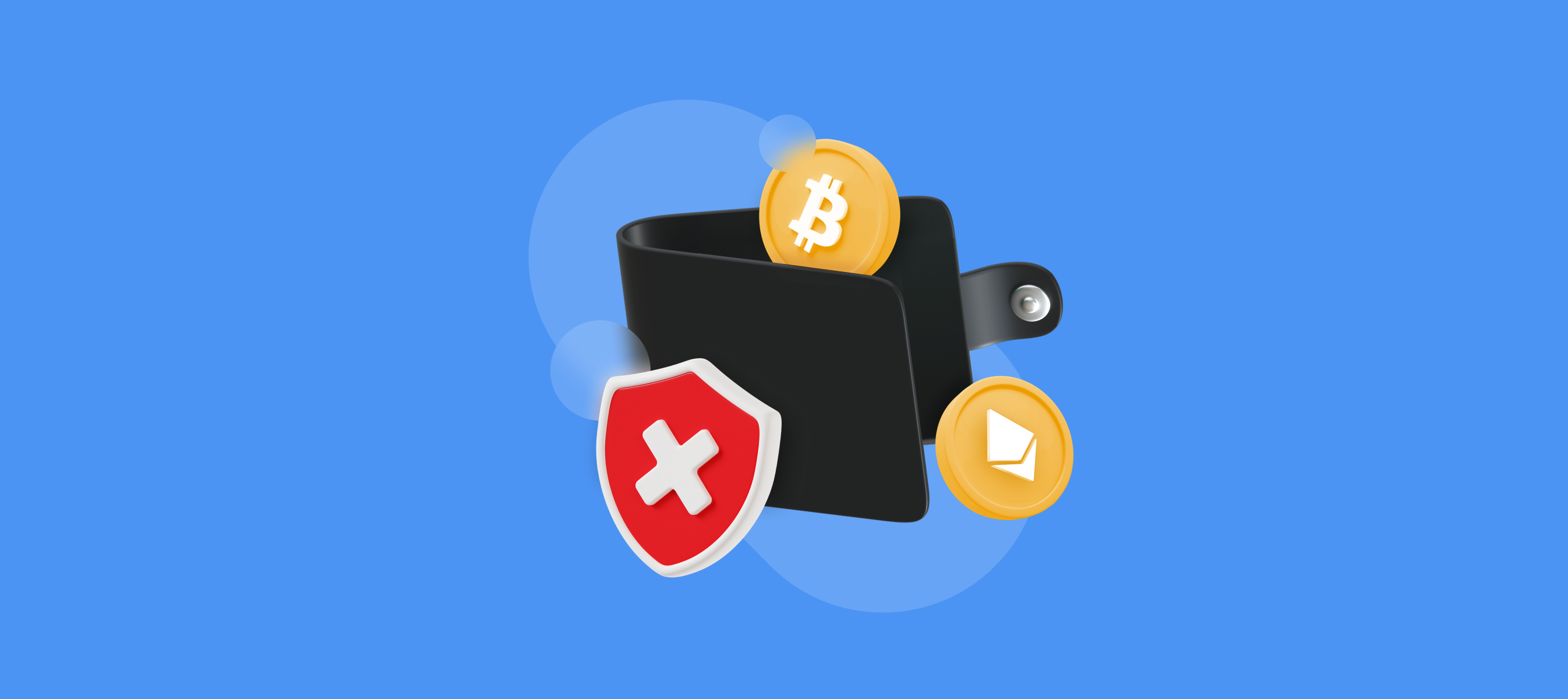5 Main Risks of a Crypto Wallet

This blog post will cover:
- Scams
- Hacking
- Loss of access
- Losing a physical wallet
- Unwanted change of ownership
- Is it worth it to have a crypto wallet?
Using services such as online crypto exchanges to trade or buy crypto comes with fees and concessions over your privacy that are well worth the received convenience in return for most people. However, some still choose to have their own non-custodial crypto wallet. Getting a crypto wallet becomes more and more popular, but its risks and problems are often ignored. Here are the most important things to consider if you are thinking about storing your tokens in your own wallet.
Scams
It is possible to access most crypto wallets with only a public and private key, without any further authentication — that’s why many phishing attempts from hackers happen. Private keys can be just as vulnerable to data breaches as passwords. Unlike passwords, private keys can never be changed, so once a private key gets leaked an owner will need a new crypto wallet to be safe. Storing a hard-to-remember private key in a text file on the computer or written down on a note in the office also makes the scammers’ job much easier.
What to do: Make sure to securely and conveniently store your private key — this will lower the chances to become a cyber crime victim. Read our article about hardware wallets and cold storage.
Hacking
Unless we are talking about a cold wallet that hackers need physical access to get into, a usual wallet will stay a potential target for hackers. This is true in the case of online banking and other services as well, but still most online financial service providers are robust companies with serious data protection solutions. Many indie crypto wallet providers that offer services that don’t have the level of cyber protection you expect them to have. There have been numerous incidents in the past years of millions of dollars getting stolen by hackers from wallets that were not protected well enough.
What to do: ensure to choose a crypto wallet provider that has a proven high standard for cybersecurity. Here’s a crypto wallets guide we wrote for you.
Loss of access
Remembering credentials is not usually very hard. For most services people can just use their email address, that they will definitely not forget and a password, that they have been most likely using for decades. However, remembering a public key and private key is an entirely different task. Most people do not even try to remember their crypto wallet credentials, so they just write it down somewhere or keep it in a text file, but that can result in other people having unwanted access. Furthermore, unlike in the case of many services, if you forget your private key, there is no way to retrieve or change it. Without your private key, you will lose access to your tokens forever.
What to do: it’s best to learn your credentials by heart. If you can not physically remember them, find a good safe place to keep them. Better have this data in some encrypted form, and hide the decryption instruction somewhere else.
Losing a physical wallet
Having a physical cold wallet may seem like a solution to many of these problems, but it has its own disadvantages. Having a physical key to perhaps most or all of your savings essentially takes you back to the financial system of the middle-ages, when people used to carry around pouches of gold worth several years of their salary. Losing a cold wallet, means losing money. If someone steals a cold wallet, one also loses his/her money. It’s better to avoid damaging a cold wallet.
What to do: if you’ve chosen a cold wallet to keep your data, ensure it is placed in a place where it won’t be broken or stolen from.
Unwanted change of ownership
A bank account always belongs to a certain person, but a crypto wallet technically might not really even belong to a specific person. Anyone who has the public and private keys has the money. Of course, like everything else, this is also more complicated from the legal perspective, but if one shares his/her crypto wallet with someone else, such as husband/wife or family and things go wrong, nothing is stopping anyone knowing the private key to take the money.
What to do: of course, you might have different reasons to give your private key to someone you trust, but remember that no one is safe from divorce, fights and betrayals. We’re not saying it’ll happen to you, but please be careful who you share your private information with.
Is it worth it to have a crypto wallet?
It all depends on your personal preferences and what you want to do with your crypto. If you are very protective of your personal data and belongings, then you might prefer having your own crypto wallet to access your crypto. Crypto wallets are better suited for storing tokens for a long time with no or minimal fees, while using 3P services are better if you want to trade crypto on a short-time basis.
Read this article in order to understand how to avoid crypto scam schemes.
SimpleSwap reminds you that this article is provided for informational purposes only and does not provide investment advice. All purchases and cryptocurrency investments are your own responsibility.

